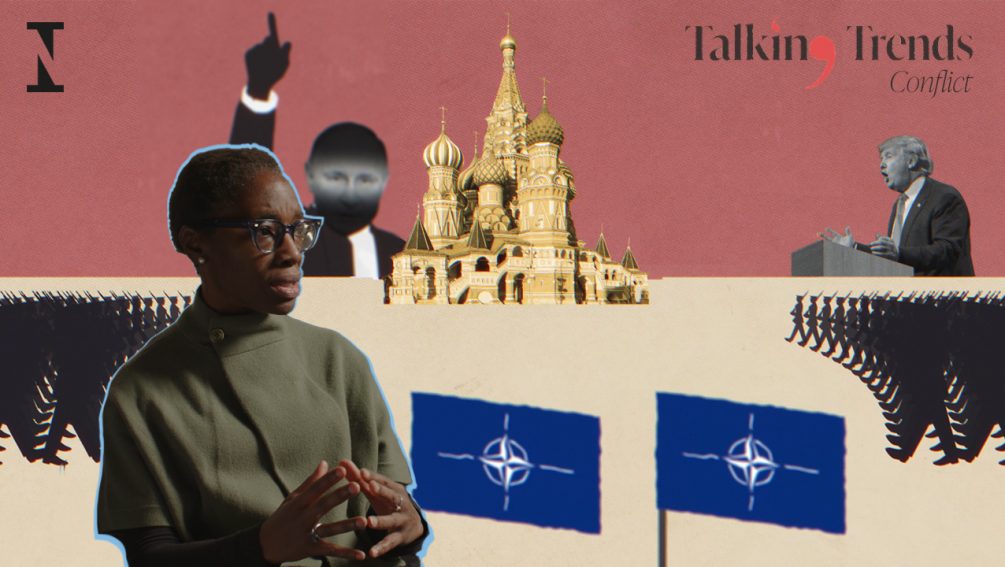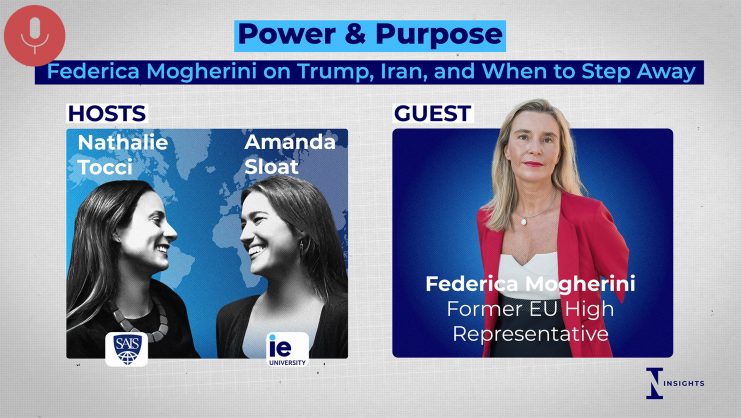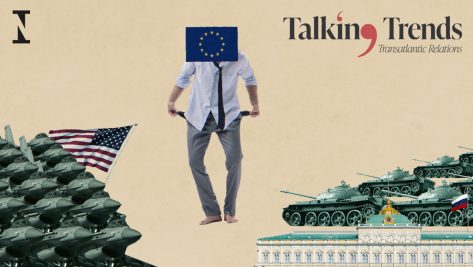Conflict & Geopolitics: Talking Trends

Conflict has been placed firmly at the top of the international agenda in recent months and years. Comfort Ero, President of International Crisis Group, sits down with Manuel Muñiz to discuss the conflicts in Gaza and Ukraine, the future of Taiwan, and how lasting peace can be built.
© IE Insights.
Transcription
Manuel Muñiz: I’m here with Comfort Ero, the president of the International Crisis Group. Thank you so much for being here with us. It’s wonderful to have you and to have this chance to talk about crises, security, violence and war in the world in a very important year, a year where we’ll see elections in dozens of countries. I think the largest democratic year in history in terms of voters being called to the polls.
How do you view the development of the war from a conflict and crisis perspective? And also, if you could give us a hint of the regional dimension to it. But maybe first, your assessment of what’s happening on the ground in Gaza.
Comfort Ero: I mean, it’s hard as we talk today with the ongoing sort of military operation. And when you look at it within the context of the casualties Gazans have lost their lives. The trauma that Israel, Israelis themselves and families who are still waiting for the release of hostages, not knowing the fate of their families, whether they’re still alive or whether their dead. It’s hard to fathom what a solution looks like as well.
When you look at it through the lens of how Israel has defined its objectives of wanting to get rid of Hamas, it’s very difficult because how do you defeat a group militarily and how do you also defeat a group’s ideology?
I think that is the dilemma that we face, that to do that requires you also to flatten Gaza. The question is what’s going to be left? A lot of people talk about the day after, but the big question is that there may not be anything left of Gaza. So I think even from that perspective it begins to look hard what it means to defeat Hamas militarily. And that’s one dilemma that confronts Israel.
The other dilemma is that there’s a sense in which Israel, and it’s not just the government, but Israelis themselves cannot fathom their fate with Gaza and Hamas still next to them on their border. The other side of the border, on the Lebanon side, equally, I think it’s very hard for Israel to think about what their future looks like with Hezbollah. Israel’s security requires us to find or begin to build a diplomatic solution. It requires us to begin to think about how you rebuild relations, how you start thinking of an arrangement that would satisfy Israel, but would also deal with the humanitarian consequences in Gaza.
MM: So let me ask you about that, because there’s sort of a first a diplomatic approach now, which is about access, humanitarian aid, minimizing the impact of the war on the civilian population in Gaza. But how does a lasting peace look like for the region? And how far are we from that, given what we’re seeing on the ground and the political dynamics, particularly in Israel? I mean, are we any closer to a two-state solution that we were some time ago? Is that the solution? I mean, how do you see that being built?
CE: It’s very hard to conceive of what the future looks like without thinking about how the war ends. And this is why I say how the war ends and what’s left of Gaza is crucial. But what is very clear to us, at Crisis Group and we’ve said it in successive briefings, is that; what you cannot take off the table in the future, and a number of people recognize that, so you cannot leave off the question of the rights of the Palestinians off the table, whether it’s a two-state solution or any other kind of political process.
Well, by the way, this was something that the Spanish government has said also repeatedly, that whatever solution is built, it needs to address the justice and rights issue of the Palestinian people. So, for example, the Abraham Accords, which have been very welcome throughout the region, and also in this part of the world, are not sufficient because to a large extent they do not address the underlying political issue.
Regardless of the Abraham Accords, I think, again, the lessons of a number of Arab countries themselves are saying that even in the guise of the normalization process, that there was a sense in which the Palestinians were being thrown under the bus, that their fate was not part of the normalization.
And I think what this crisis, what the 7th of October has revealed, and it’s not a justification, however, is that the question of the rights of Palestinians cannot be ignored any longer. It’s hard to ignore the context, to acknowledge the context does not mean that you don’t recognize the heinous crimes on the seventh.
So I think we’re very clear of that there’s also a recognition of the right for any country to protect its citizens as well. And as we speak, we are seeing now that the very one thing that, Israel and the US and Iran say they want to avoid is a regional sort of conflagration as well. And yet, we’re seeing the Houthis are the reasons why they’re saying that they’re doing it is in the name of wanting to see an end to the fighting as well. But yet, as we speak we’re seeing the spread of the conflict as well. And I think that adds to the complexity.
MM: And let me ask you about another conflict that is there and we should watch. The war in Gaza has also deviated a lot of the attention that was that was focused on Ukraine. And in Ukraine, we’ve seen, you know, large armies, large deployments, lots of deaths, lots of loss of conventional equipment, very advanced as well with drones and other kinds of weapons. But an extraordinary conflict unprecedented in its scale and its significance for Europe since the end of the Second World War.
How do you see it evolving? Can you imagine a lasting solution to the conflict? And this is a tough, tough question for anybody, but maybe you have some ideas.
CE: I mean, look, the counter-offensive hasn’t played out in the way Zelensky and European allies and Western allies had thought. There’s a sense in which we’re coming up to a very bleak winter for Ukraine. There’s a sense in which Moscow also will hit out at key cities, key sites, but makes this a very sort of difficult moment for Ukraine, number one.
Number two, unlike 2023 and 2022, where we were very clear that we were watching a very unified Europe, a very unified Western alliance. Ukraine has sort of become a political football in Washington as well. And it’s part of the tension between the Republican Congress and White House and just passing the bill, passing the aid bill that will support Ukraine, has been a real political test for Biden as well. Zelensky is looking very nervous, very wary of that Western alliance. And it is in this mix also, that hangs the question about the fate of Ukraine.
It’s also happening, at a very delicate time internationally. You talked about 60 or so elections. The most important one, the most consequential one, that everybody’s concerned about is the US. If Trump was to win, he’s already told us what his foreign policy is going to be like vis-a-vis Ukraine. So it’s a race to the 8th of November before those elections.
In terms of what Biden needs to do, in terms of the diplomacy for Ukraine and also for what Europe needs to do, I think the message also that Biden is giving is that, you need to up your game. Europe as well. We need to do the ammunitions. And so you ask a crucial question like you ask for Israel-Palestine, what is the end game diplomacy? I think, quite frankly, we’re in for a long haul here. If I were in the Kremlin looking at this from Putin, I’m looking okay because the West is wavering potentially my ally in the form of Trump comes into power. I’ve tilted my economy to be a war economy. I can throw my human resources people to this conflict as well. So it looks good for me if I was in the Kremlin today, even though things also look shaky at home. But he comes out of it looking slightly confident as well. I mean, his objective is clearly to survive 2024, sustain the effort and allow for this uncertainty to play out in the West and see the effects.
MM: I have a final question. Conflicts to watch. Do you expect a major conflict in 2024 in the Taiwan Straits? Is this something that is a concern for you beyond the diplomatic tension?
CE: But something on the war, conflict front. When the very first message that you hear on New Year’s Day, depending on where you are in the world, is Xi Jinping saying that the future of Taiwan is still very much in China, then you ask yourself a number of questions as well about what does that mean in practical terms?
Look, let me answer your question this way, because those elections have happened. Yes. And the separatist, at least if you’re looking at it from Beijing’s eye, has won. And that raises a number of questions, therefore, about the future of Taiwan. When I look at the international arena, yes wars are rising. Yes, we’re seeing even more proxy wars. What remains taboo in the international arena is this idea that you can violate borders, that you can mount an invasion across another country as well.
The big question, which is your question, is whether we see the risk of another invasion. I still think and we said it in 2021 and 2022, that we do put Taiwan in terms of China going in there as a low risk but high risk in terms of miscalculation between the US and China on the South China Sea.
MM: Very final question, which is on the future war and conflict, impact of A.I. and A.I. tools across the whole sort of suite of weapons, drones. I mean, it’s out of space technology. So how are you looking at that if it’s at all?
CE: I would like to make one thing sort of very clear for casualties in Ukraine that you mentioned the casualties in Gaza and also the deaths that you’ve seen in Sudan and Ethiopia and Yemen and Haiti. These were caused by conventional weapons. These were caused by the classic military that we use. And of course, we’ve seen how drones have come in and completely altered the field whether it’s in Nagorno-Karabakh or even in Ethiopia. And where we talk the toll of human catastrophe, the toll of casualties are being caused today by conventional warfare. And that, I think, will continue to live with us for a very long time.
Well, thank you so much Comfort again for being here and for sharing your thoughts and your work with us.
CE: And thank you once again for inviting me on to your Insights.










